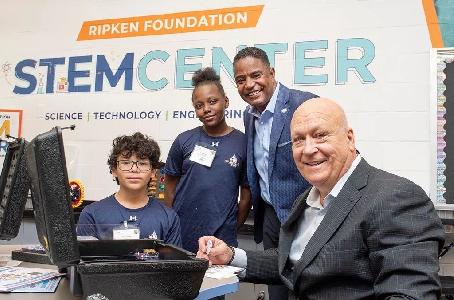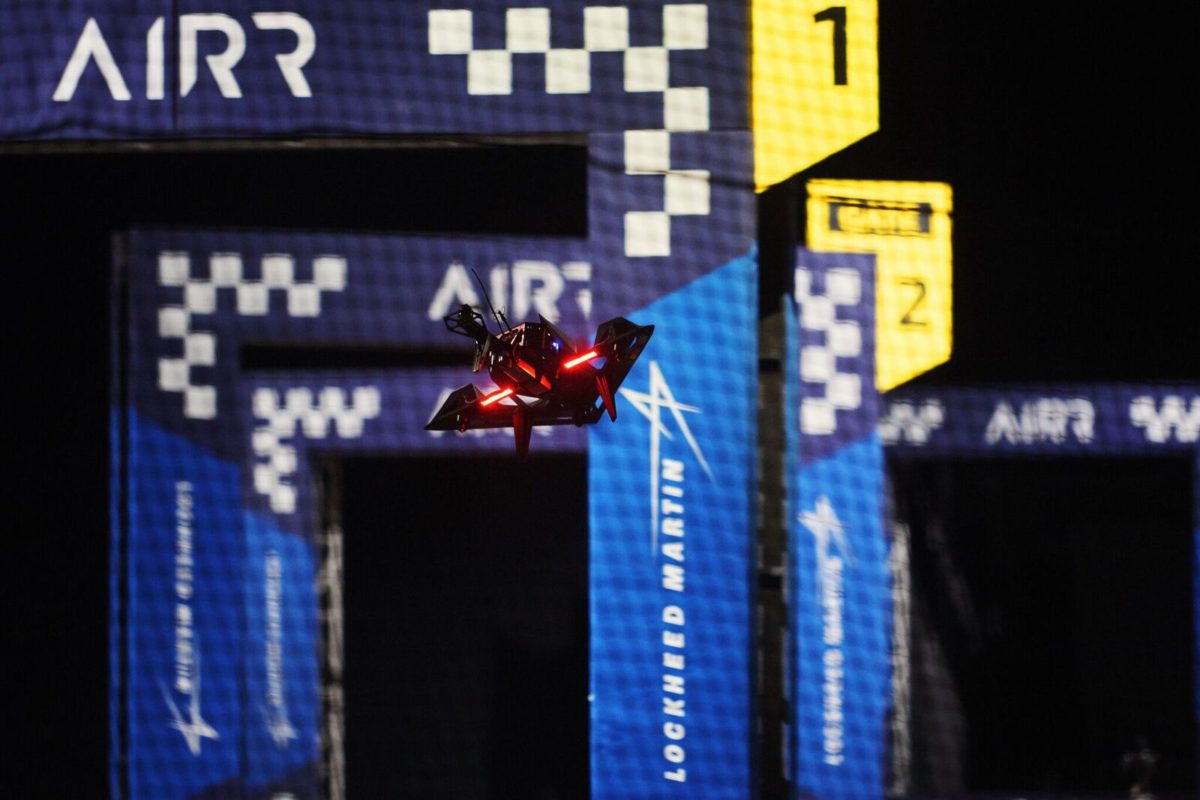On Friday night at the Baltimore Convention Center, drones took off inside a netted course, navigated obstacles and crash landed.
Unlike most drone races, all of this was done without humans at a controller.
Baltimore was the third stop on the Artificial Intelligence Robotic Racing (AIRR) a circuit organized by Bethesda-based Lockheed Martin and the New York-based Drone Racing League, which broadcasts UAV competition on Twitter and NBC. The two organizations teamed up to launch the event, which initially drew 424 applications from around the world. Nine “Alpha Pilot” teams were selected and are now competing on the circuit.
Drone Racing League provides a place for professional pilots to take flight in competition. James Slider, the league’s director of special projects, said the event is a way of bringing “virtual players into the human world.”
“It’s basically taking a computer player and putting it into a human sport, and seeing if it can beat human players on a level playing field, with the same hardware and the same courses,” he said.
Instead of piloting skills, the teams competing in these races put skills for programming and developing algorithms to the test. They’re provided with a Lockheed Martin-developed custom coding environment, and each team competes with the same drone, dubbed the DRL RacerAI. There are chances to test the code and the course. But when race time comes, the teams must submit algorithms, then sit back and watch to see how the drones perform.
Just some Friday evening autonomous drone racing in Baltimore with @DroneRaceLeague @LockheedMartin in town for AI + UAV competition pic.twitter.com/0voCl8LIyQ
— Technical.ly Baltimore (@TechnicallyBMR) November 15, 2019
“There’s this moment of anticipation where everyone leans forward and says, ‘Whats the drone going to do?'” Slider said. “Sometimes it spectacularly crashes and sometimes it navigates the whole course. It’s a mixed bag.”
This played out on the course. The drones took off with a burst, but then moved more slowly than they would if humans were piloting. One drone was able to make it through two obstacles, while another hit the first obstacle and crashed.
The question put forward by organizers is how long before an AI-powered drone can rival that of a Drone Racing League pilot. Along with racing, the event also featured chats with AI experts about the technology. Keith Lynn, AlphaPilot program manager at Lockheed Martin, said his team is seeing progress each time, even though there is still a long way to catch up. The teams are working toward a final competition in Austin next month.
“I think we’re going to see in Austin that it might be a lot sooner than some people think,” he said.
For Lockheed Martin, the technology has applications beyond the race course. The company got interested in partnering with Drone Racing League because of its interest in flight and autonomous systems. These have implications for innovation from space flight to deep sea exploration. And even on land, AI advances can help teams.
“It’s all about helping people do their jobs better and keeping them safer,” Lynn said.
While in Baltimore, they also took time to engage locally. Slider and Lynn said that in addition to the race, the Alpha Pilot organizers also held a STEM event and tour of the course with Johns Hopkins University robotics students. With headquarters in Maryland, Lockheed Martin has a significant presence of employees and customers in the area.
“We wanted to get it as close to them as we could,” Lynn said.
Join the conversation!
Find news, events, jobs and people who share your interests on Technical.ly's open community Slack

Baltimore daily roundup: The city's new esports lab; a conference in Wilmington; GBC reports $4B of economic activity

Baltimore daily roundup: Find your next coworking space; sea turtle legislation; Dali raided and sued

Baltimore daily roundup: Johns Hopkins dedicates The Pava Center; Q1's VC outlook; Cal Ripken inaugurates youth STEM center


